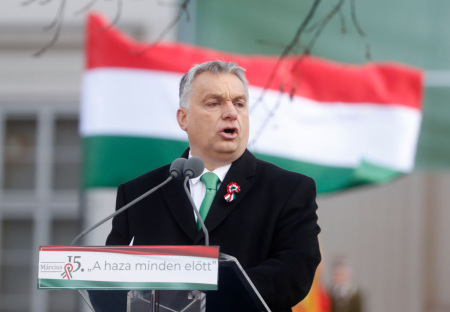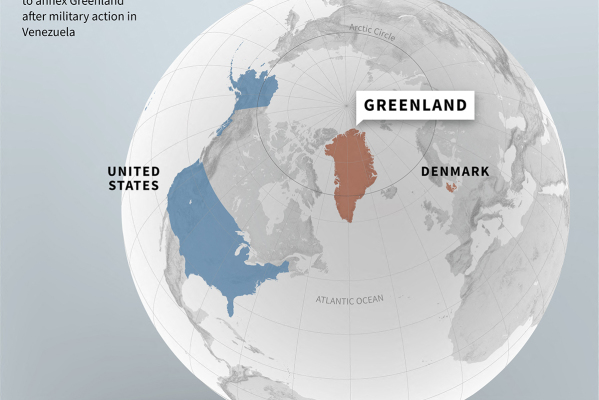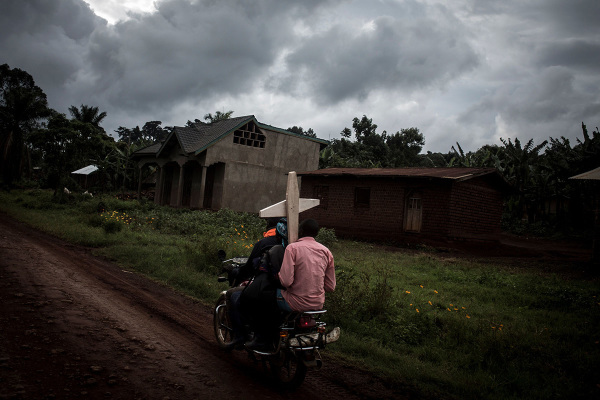Hungary PM Orban says re-election validates 'Christian democratic, conservative politics'

Hungarian Prime Minister Viktor Orban has won re-election, attributing his victory to the popularity of his “brand of Christian democratic, conservative, patriotic politics.”
According to Hungary’s National Election Office, with more than 98% of votes counted, Orban’s Fidesz party captured 53.29% of the vote and 135 seats in the parliamentary elections held Sunday, enough to secure a supermajority in the 199-seat Parliament.
A coalition of opposition political parties titled United for Hungary received the second-highest share of votes and seats, accumulating 34.89% of the vote and 56 seats.
Seven of the remaining eight seats in Parliament went to the “Our Country” party, which captured 6.15% of the vote in the election. The eighth seat went to a minor political party, the National Self-Government of Hungarian Germans.
Addressing supporters after his victory, Orban proclaimed that “the whole world has seen tonight in Budapest that our brand of Christian democratic, conservative, patriotic politics has won.”
Orban addressed the influence of liberal Hungarian-born billionaire George Soros and other international forces in the election.
“We had to fight the biggest, overwhelming force: the left at home, the international left, the Brussels bureaucrats, the Soros empire with all its money, the international mainstream media and in the end, the Ukrainian president,” Orban stated.
In Sunday’s election, Hungarian voters also weighed in on several referendums related to LGBT issues.
Voters in the eastern European country overwhelmingly rejected ballot measures that would have allowed “sexual orientation sessions for minor children in public education without parental consent,” “the promotion of gender reassignment surgery for minors,” “the unrestricted introduction of sexual media content to minors” and “the display of gender-sensitive media content to minors.”
More than 90% of Hungarians voted against adopting each policy proposal.
The promotion of sex changes for minors had the highest level of opposition (95.89%), followed by the exposure of minor children to sexually explicit material (95.32%), the display of gender-sensitive media content to minors (95.17%) and counseling children about their sexual orientation and gender identity without parental consent (92.34%).
Orban’s re-election comes three weeks after the Hungarian Parliament elected Katalin Novak, an Orban ally, to become the country’s first female president.
In a 2019 interview with The Christian Post in her capacity as Hungary’s Minister of State for family, youth and international affairs in the Orban administration, Novak said the Hungarian government was “working closely” with the Trump administration. She said the administration wanted “to get some detail on our pro-family policies and the measures that we have introduced in the last nine years.”
Throughout his tenure as prime minister, Orban’s government has enacted policies designed to make it easier for people to raise families. They contend this was necessary to reverse the declining birthrates that have plagued Hungary and Europe as a whole in recent years.
Specifically, the Hungarian government created the Family Housing Allowance Program, which provides subsidies so parents can buy or build a new home.
The amount of money a family receives under the Family Housing Allowance Program increases based on the number of children. While a family with one child can receive a subsidy of $2,160.72, families with three or more children can receive $36,000.
Additional pro-natalist policies embraced by the Hungarian government include free daycare, three years of paid parental leave, free kindergarten, assistance with student loan payments and the exemption of mothers with four or more children from paying an income tax.
Additionally, in 2020, the government passed an amendment to the Fundamental Law of Hungary, the country’s equivalent of a constitution, that recognizes marriage as an institution between one man and woman and bans same-sex couples from adopting children.
Under the new policy, only married couples in a heterosexual relationship can adopt children.
Previously, the Hungarian Parliament passed a measure defining gender as “biological sex based on primary sex characteristics and chromosomes.” Hungary was also one of 31 countries to sign the Geneva Consensus Declaration, which asserts that “there is no international right to abortion.”
While Orban has received praise from former President Donald Trump and other conservatives in the U.S. for enacting conservative policies as much of western Europe embraces secularism and socialism, critics have decried Orban as a threat to democracy.
On the campaign trail ahead of the 2020 presidential election, then-candidate Joe Biden listed Hungary as one of several “totalitarian regimes in the world” and lambasted his opponent, then-President Donald Trump for his embrace of “all the thugs in the world.”
Orban reacted to Biden’s characterization of Hungary in a 2021 interview with Fox News.
The prime minister contended that the hostile rhetoric directed at Hungary by liberal politicians and thinkers in other Western countries stems from jealousy that the country is a “success story” as “a conservative national alternative” that is “even more successful than a leftist liberal government.”
Meanwhile, critics of Orban insist that their aversion to the Hungarian leader is based on genuine concerns.
Writing for The Bulwark, a website founded by Republican critics of former President Donald Trump, Texas Lutheran University Theology Professor H. David Baer suggested that Orban won re-election because “the system is rigged.”
“Hungary left the democratic station long ago and is well down the road to competitive autocracy,” Baer maintained. “Orban controls the media; he controls the educational system; he controls large segments of the economy; he controls regional politics through a system of patronage.”
Orban has also faced pushback for his position on the ongoing conflict between Russia and Ukraine. He has voiced opposition to European Union sanctions on Russian oil and gas imports.
Orban has described keeping Hungary “out of this war” as “the most important” priority.
“We condemn the war; especially, that it is here in our neighborhood; we say no to violence, we stand together with our allies, and all this is important,” the prime minister remarked.
Ryan Foley is a reporter for The Christian Post. He can be reached at: ryan.foley@christianpost.com





















